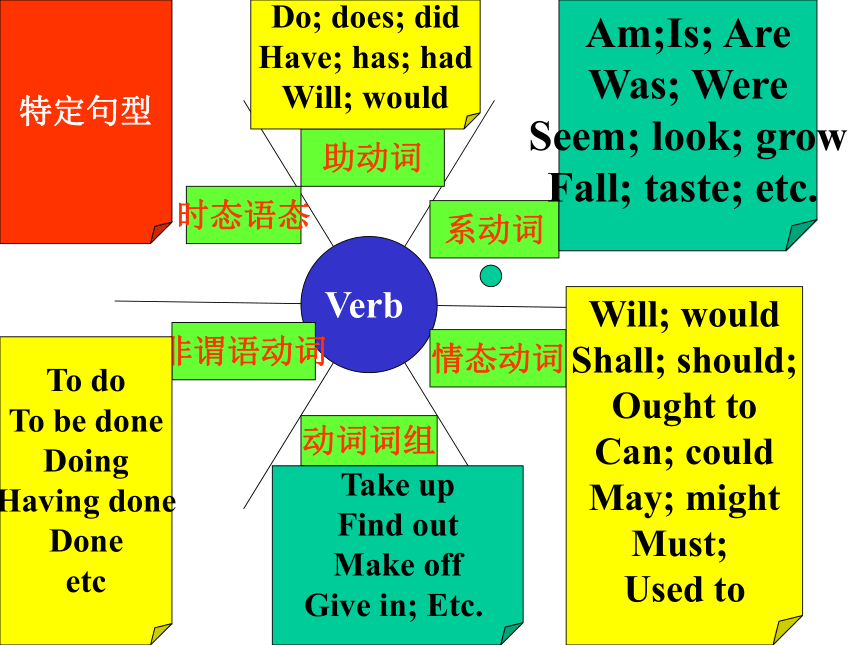
课件85张PPT。Verb 助动词系动词情态动词动词词组非谓语动词时态语态Do; does; did Have; has; had Will; wouldAm;Is; Are Was; Were Seem; look; grow Fall; taste; etc. Will; would Shall; should; Ought to Can; could May; might Must; Used toTake up Find out Make off Give in; Etc. To do To be done Doing Having done Done etc特定句型情态动词一、特征 1)?????情态动词本身有词义,表示说话人的语气或情态,但词义不完全,不能单独作谓语动 词,只能和不带to的动词不定式(即动词原型)(ought等除外)一起构成谓语动词. 2)?????情态动词所表示的情态有: 命令、允许、请求、拒绝、愿望、愿意、义务、必要、可能、敢于、需要等. 二、形式变化1) 情态动词没有人称和数的变化, 第三人称单数 的现在时也无变化.2) 有些情态动词有过去式, 有的过去式和它的原型相同. a. 有过去式的有: can — could may — might will — would shall — should dare — dared need — needed have to — had tob. 过去式不变的有: must — must (或had to) ought to — ought to 三、否定式shall not — shan’t will not — won’t can not — can’t must not — mustn’t should not — shouldn’t ought not to would not — wouldn’t could not — couldn’t dare not — daren’t need not — needn’t四、情态动词的种类 要运用好情态动词,就要首先对情态动词有一个完整的认识,情态动词分为三种情况: 1.??只用作情态动词的有: must, can / could, may / might, ought to, be able to 2.?既可作情态动词又可作实义动词的有: need, dare, 3.?既可作情态动词又为助动词的有: shall / should / will / would1 can / could / be able to 1) He can speak French. When he was young, he could sing very well.4) Anyone can make mistakes.2) Could you please……?Boys can’t wear long hair in our class.3) How can you be so rude? can / be able to Last night, the fire spread through the hotel very quickly but everyone _____ get out. was able to 5 ) Can this news be true?This can’t be * * . She is in the office.6) The weather here can be very hot .2 may / might1) --May I use your pen? -- yes, you may. --No, you mustn’t.2) It may/ might rain tomorrow.3) May all your dreams come true.4) may (might) as well do= had better do最好There is nothing to do ,so I may as well go to bed.3 must/ have to 1) We must work hard.We have to be here before 7:30.2) must--mustn’t -- needn’t-Must I water the flowers? -yes, you must. -No, you needn’t/ don’t’ have to.3) must+ v can’t+ v He must be at the library. 4) Must用在肯定句中表示“偏偏”。 Naturally, after I told her what to do, my daughter must go and do the opposite. 自然地,在我交代女儿做什么之后,她偏偏要做相反的事情 4 dare 1情态动词 dare- dared daren’tDare he do it ? He dare not do it.2) 实义动词 dare to do She dared to walk at night.3) I dare say She didn’t dare (to)…She is a bit shy and _____ stand up and answer the teacher's questions. A.dares not B.doesn't dare to C.dare not to D.dares not to I wonder how he ___ to his father like that. A.dared speak B.dare speaking C.dared to speaking D.dare to speak BA5 need1) You needn’t call him.2) – Need I come? -- Yes, you must.-- No, you needn’t/don’t have to.3) 实义动词 (sb) need to do (sth) need to ... ...
~~ 您好,已阅读到文档的结尾了 ~~

